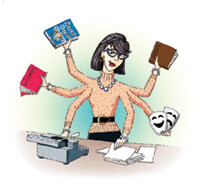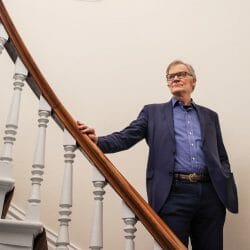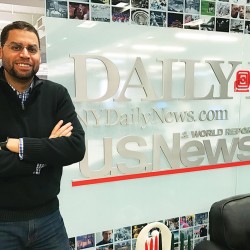Changing Courses
In 1958, my freshman year, I arrived on campus after traveling from New York City to Chicago on the Twentieth-Century Limited, then catching the Milwaukee Road to Madison, about an eighteen-hour journey. My dorm, Hampton House, was on Langdon Street — fraternity and sorority row — and in that golden September light, I felt I had landed on a movie set. As I watched the clean-cut occupants of those houses greet one another after a summer’s absence, the college-themed musical Good News, starring June Allyson and Peter Lawford, came to mind.
The scene was both enticingly alien and welcoming, and I could almost hear strains of “Varsity Drag.”
I had been drawn to Madison because I wanted to leave New York, at least for a while; because I could start out in Integrated Liberal Studies (ILS); and because I could later major in what was then prosaically called speech (now theater and drama).
The theater, and especially backstage life, had been my passion, helped along by the fact that my father was a television dramatist in what is now called the medium’s Golden Age. One of his colleagues, Jerry McNeely MS’50, PhD’56, who divided his time between writing for some of the most popular shows and teaching in the university’s speech department, had agreed to be my adviser. So I thought I was all set. And yet, one of the great benefits of sifting and winnowing — not just at Wisconsin, but at any good American college or university — is the opportunity one has to change course.
First, I bid ILS a speedy good-bye. Since I had come from a high school graduating class of eighty, this two-year college within a college had seemed like a good way to keep from being overwhelmed by a freshman class of 2,700. It turned out, though, that I liked being overwhelmed, and after a sequestered semester, I opted out.
That led me to the Letters & Science (L&S) catalogue of courses listed for the second semester, and I pored over it with the delight of a prairie girl of the 1890s presented with the Sears & Roebuck catalogue. That girl might have yearned for a gingham dress, but it was history that caught my eye.
Years later, after my mother’s death, I discovered a four-page letter from me in her desk that had mapped the new course of my life.
In it, I explained a radical change of heart. First, I listed the dreary required courses for a speech major: Application of Speech Fundamentals, Psychology of Speech and Hearing, Argumentation and Debate, and on and on. Then I wrote, “I have just looked at the history requirements, and they are delightful. I won’t even bother looking at poli sci, because history encompasses so much more (culture, government, foreign policy, etc.), so there is my choice.”
I eased into my new major in the most relaxed manner, never having to focus on a particular period or place, as I studied pre- Revolutionary Russia with Michael Petrovich, Reconstruction with William Hesseltine, and European history with George Mosse.
It was all very agreeable — except for my looming anxiety about what would happen next. I was tempted never to leave Madison and to continue on in graduate school. But, to throw some cold water into this idyll, I had never had a female history instructor, not even a teaching assistant. Although this lack of role models didn’t really strike me until many years later, it had a subtle influence. My generation of undergraduates moved in to change all that, but in any case, I suspected I wasn’t cut out to teach. I returned to New York somewhat depressed, knowing that the next step was a season at secretarial school, as I learned to become employable.
It was very hard to leave Madison, and in a sense I never have. My secretarial training, gloomily embarked upon, won me a job at American Heritage magazine, and there I stayed until 2007, when Forbes, its owner, sold it.
During those forty-plus years, I was appointed picture editor, senior editor, travel editor, and founding editor of Heritage’s offspring American Legacy, an African-American history magazine. In effect, I became a perpetual graduate student after all, with a paycheck attached. Each of the hundreds of articles I worked on over the years taught me something new, reminding me even now of nothing so much as picking and choosing from the L&S course catalogue that a long-ago eighteen-year-old found so delightful.
Carla Davidson ’62 is a freelance writer living in New York.
Published in the Spring 2011 issue




Comments
Linda Kimbrig Nadler November 11, 2011
I remember you well from ILS and PE. I loved your article which brought back memories of our first semester in Madison.